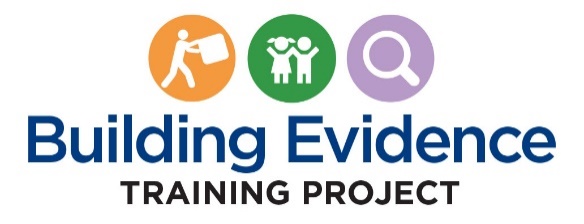Building Evidence Training (BET) Project Usability Testing
Fast Track Generic Clearance for Collection of Qualitative Feedback on Agency Service Delivery
Unit 5 Pre-Post Test OMB Final
Building Evidence Training (BET) Project Usability Testing
OMB: 0970-0401
Expiration Date: 05/31/2021
PAPERWORK REDUCTION ACT OF 1995 (Pub. L. 104-13) STATEMENT OF PUBLIC BURDEN: The purpose of this information collection is to gain feedback on the course content and delivery. Public reporting burden for this collection of information is estimated to average .12 hours per response, including the time for reviewing instructions, gathering and maintaining the data needed, and reviewing the collection of information. This is a voluntary collection of information. An agency may not conduct or sponsor, and a person is not required to respond to, a collection of information subject to the requirements of the Paperwork Reduction Act of 1995, unless it displays a currently valid OMB control number. If you have any comments on this collection of information, please contact the Building Evidence Training Project at: [email protected]
Designing and Implementing
Evidence-Supported Interventions in Child Welfare
Unit 5 PRE/POST TEST: Installation and Initial Implementation
Note: These questions will be assembled to create both the pretest and posttest for Unit 5.
Questions
Practice profiles describe:
How an intervention will work in everyday practice
The skills and expertise of the implementation team members
Protocols for collecting data
Strategies for engaging key partners and stakeholders on implementation teams
Even when an intervention is provided by an outside agency, frontline workers and supervisors typically play important roles in referring children and families to the intervention, supporting their participation, and observing their response.
A theory of change: (modified cumulative question)
Identifies the problems in a client’s life that require treatment.
Is developed after an intervention is selected to communicate to stakeholders how it will address the problem.
Operationalizes the intervention by providing criteria for measuring fidelity.
Is a hypothesis that describes the root cause of the problem, the desired outcome(s), and how to reach those outcomes.
The stage of the Development, Implementation, and Assessment Approach when an agency prepares for implementation by making sure the intervention is clearly defined and will be well supported is the:
Sustainability Stage
Full Implementation Stage
Exploration Stage
Installation Stage
Initial Implementation Stage
When Diamond County workers and supervisors identified a potential challenge in talking to parents and relatives who had concerns about Medication Assisted Treatment, this was an example of:
How usability testing could help the implementation team understand how families in the community will respond to the intervention.
Practice profiles demonstrating that the intervention was not being implemented as intended.
A communications protocol lacking adequately specific behavioral indicators for working with families.
Confirmation that Diamond County should select a different intervention.
Data to guide decision-making throughout implementation will be needed on:
An agency is preparing to enter the Initial Implementation stage of implementation. By this time the following should already be in place: (Cumulative question)
Teaming Charter, Communications Protocol, Theory of Change, Practice Profiles, Implementation Supports
Communications Protocol, Theory of Change, Adapted Intervention, Implementation Supports, Usability Testing Results
Parent Training, Theory of Change, Selected Intervention, Implementation Supports, Practice Profiles
Teaming Charter, Communications Protocol, Theory of Change, Adapted Intervention, Implementation Supports, Evaluation Results
Teaming Charter, Communications Protocol, Selected Intervention, Implementation Supports, Full Implementation of Intervention
Which answer is an example of a specific contribution of leadership in supporting implementation during the Installation Stage?
Enforcing strict adherence to manuals provided by the intervention developers
Reviewing data to remove outliers that will skew the evaluation results
Ensuring the provision of resources needed for the intervention and implementation supports
Discussing the intervention with individual families during usability testing
The recruitment and hiring of staff to implement an intervention is an example of: (modified cumulative question)
An adaptation of the intervention
An implementation support
Data collection
A fidelity assessment
The ___________ Stage follows the Installation stage and includes _____________.
Full Implementation . . . . . usability testing.
Full Implementation . . . . . preparation of implementation supports.
Initial Implementation . . . . . usability testing.
Initial Implementation . . . . . revision of the theory of change.
Exploration . . . . . teaming protocols.
Exploration . . . . theory of change development.
Unit 5 Pre/Post Test Questions
| File Type | application/vnd.openxmlformats-officedocument.wordprocessingml.document |
| File Modified | 0000-00-00 |
| File Created | 2021-01-13 |
© 2026 OMB.report | Privacy Policy